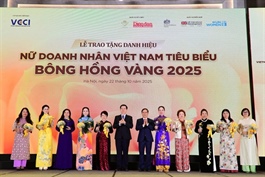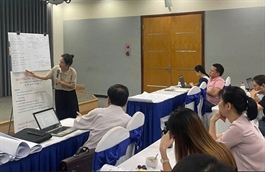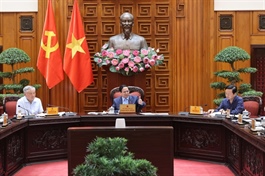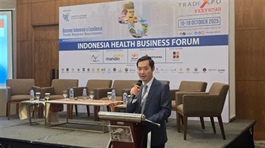Urgent issues must be resolved to stop counterfeits: workshop
Urgent issues must be resolved to stop counterfeits: workshop
The workshop focused on four key issues: understanding of counterfeit goods, penalties for violations, fund management for anti-counterfeiting, and technology-based prevention measures.
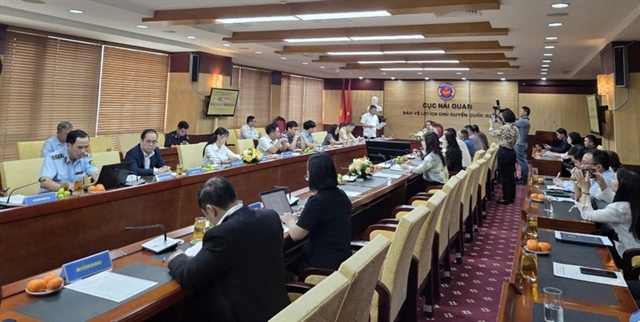
Government officials meet at a workshop on counterfeiting on October 22, Hà Nội. VGP Photo |
Counterfeiting has become increasingly complex, with more sophisticated methods and a strong shift toward e-commerce and cross-border activities.
Improving awareness, completing a legal framework and accelerating technological solutions are urgent tasks, said Lê Thanh Hải, Chief of the Standing Office of the National Steering Committee 389 (Anti-Counterfeiting) at a workshop in Hà Nội yesterday.
The workshop focused on four key issues: understanding of counterfeit goods, penalties for violations, fund management for anti-counterfeiting, and technology-based prevention measures. Other topics, such as results from previous quarters, were compiled separately.
Relevant provisions can be found in multiple documents, including the Penal Code (Articles 192–195), the Law on Pharmacy, and Government Decree No. 98/2020/NĐ-CP on administrative penalties. However, existing rules mainly list behaviours and signs without providing a single, legally binding definition of 'counterfeit goods'.
Hoàng Ninh, Deputy Director General of the Department of E-Commerce and Digital Economy (Ministry of Industry and Trade), noted that e-commerce in Việt Nam is booming but also faces serious risks from counterfeit goods and intellectual property violations online. These issues harm consumers, damage trust, and hurt legitimate businesses.
Under the ministry's guidance, the Department has drafted a new E-Commerce Law to replace outdated decrees, such as No. 52/2013/NĐ-CP. The draft takes a proactive approach, defining the roles and responsibilities of all stakeholders rather than focusing solely on sellers.
First, it explicitly bans acts related to counterfeit trading, smuggling and intellectual property violations.
Second, it heightens platform responsibility: e-commerce platforms and social networks must act as 'gatekeepers', screening goods before listing and verifying seller identities via VNID. Foreign sellers must submit legal business documents to prevent fake accounts.
Third, platforms will bear joint liability for damages if they fail to remove violations, pushing them to invest in monitoring systems.
Fourth, logistics providers will be required to verify shipment records and reject goods of unclear origin.
Fifth, livestream sales, now a booming channel, will be tightly controlled, requiring verified identities and allowing immediate suspension of violating broadcasts.
Nguyễn Đức Lê, Deputy Head of Market Management Operations (Ministry of Industry and Trade), said enforcement agencies face overlapping and inconsistent provisions in current laws, especially for sensitive products like dietary supplements, pharmaceuticals, and cooking oils.
According to Lê, the boundary between administrative and criminal measures is often thin. Misjudging a case may either let violators escape punishment or impose excessive sanctions. He called for a unified, codified definition of 'counterfeit goods' as a legal foundation to ensure consistent enforcement. Consultation among ministries, localities, and enterprises has shown differing views, making a balanced solution essential.
In the field of health, Tạ Mạnh Hùng, Deputy Director General of the Drug Administration of Việt Nam (Ministry of Health), said that in 2024, substandard drugs accounted for 0.45 per cent and counterfeit drugs 0.1 per cent of over 38,000 samples tested. Despite these small proportions, fake medicine crimes persist, especially after the COVID-19 pandemic, when healthcare demand rose.
“Fake medicines not only endanger patients but also erode confidence in legitimate drugs and create paths for transnational crime,” he warned.
Many pharmaceutical firms now use anti-counterfeit stamps and QR codes to help consumers verify product origins. The Drug Administration will work with other agencies and enterprises to tighten anti-counterfeit regulations and traceability, while coordinating with the Ministry of Industry and Trade and the police to strengthen inspection and investigation, aiming to root out counterfeit drug networks.
- 08:40 23/10/2025



